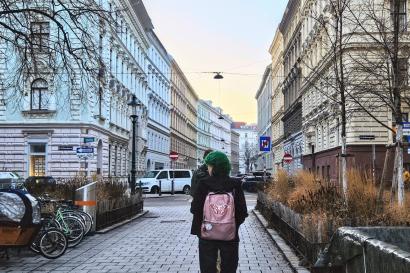5 am wake up call, hour bus ride to Quito Airport, 30 minute flight from Quito to Coca Airport, 10 minute bus ride from Coca to loading docks, 2 hour boat ride in a small canoe through a torrential downpour on the Napo river, 3 hour long Chiva ride on a gravel road as the rain slowed to a stop, then back on a boat for 2.5 hours to arrive at Tiputini Research station in the heart of the Amazon Jungle in Yasuni.
As we glided through the Tiputini River it seemed to me that we were the ones that were horribly out of place with the constant hum of the motor in stark contrast to the serene sounds of nature all around us. The minute we cut the motor and slowed to a stop to observe the river dolphins or the caiman on the shore I realized that the soundtrack that surrounded us was opposite from the constant car horns and people out and about at all times of the day and night in Quito. Instead, I heard birds whistling, monkeys calling and swinging through the trees above, and the trickling of the river beneath the canoe.
In the few short days that I spent at the Tiputini Research Station I saw insects and spiders bigger than my hands, monkeys swinging in the canopy, and 400 year old trees towering above me. Everywhere I looked had a different species or form of life. Yasuni National Park, an UNESCO World Heritage Site has the GREATEST concentration of biodiversity on earth with over 600 tree species/hectare (in comparison to a mere 560 tree species in all of North America) and over 100,000 species of insects/hectare. While the statistics for birds, mammals, and other forms of life are equally as astonishing. I was constantly in awe of the capability of certain tree species or the unique symbiotic relationship between many different forms of life that surrounded me in the jungle
During my time in Yasuni, as I realized that I am one of very few that have ever stepped foot quite so deep in the rainforest, it hit me that many people probably just don’t understand what a special place it is, and that is why we are experiencing such rapid rates of deforestation. Sadly, Yasuni, with the most concentrated amount of biodiversity on earth is also situated directly above Ecuador’s richest oil reserves. As a country that is struggling to develop and keep up in our globalized economy, the government has not prioritized the diversity of the rainforest. Ecuador is currently drilling extensively throughout the Yasuni. Indigenous cultures are being altered and more and more of untouched pristine forests is being changed thanks to oil roads and infiltration of human greed.
Yet, as I have learned time and time again throughout my time studying in Ecuador, at times environmental conservation and sustainability is often a luxury. If a community is fighting to survive each and every day and is forced to choose between putting food on the table and living sustainably, it is understandable why preserving the Yasuni may not be at the top of their priority list. But the importance in investing in the protection of the world’s most biodiverse areas is often not fully understood. Only 20% of the species in the Yasuni have been recorded. That means that there are still so many plants, mammals, and insects that have yet to be discovered. What if we drive the cure for cancer or the common cold to extinction without ever even knowing that the plant existed? Fully understanding the importance of protecting biodiversity in the Yasuni and areas around the world is essential, but a hard concept to sell without the knowledge of exactly how remarkable this place is. I want future generations to know a world as beautiful and diverse as I have seen all around me throughout my semester in Ecuador. I want people to understand the gift that nature is and protect it for all it is worth. So this week, with the celebration of Earth Day I wanted to share just a glimpse at what I have seen and why it is worth protecting.

Alissa Welker
I am a junior Environmental Science Major with a Peace and Justice Concentration and Spanish minor at Villanova University. I love backpacking, traveling and new adventures. I am so excited to be spending the semester in Quito, Ecuador and I hope that these posts will help you experience the culture and beauty of life in South America through my eyes.








